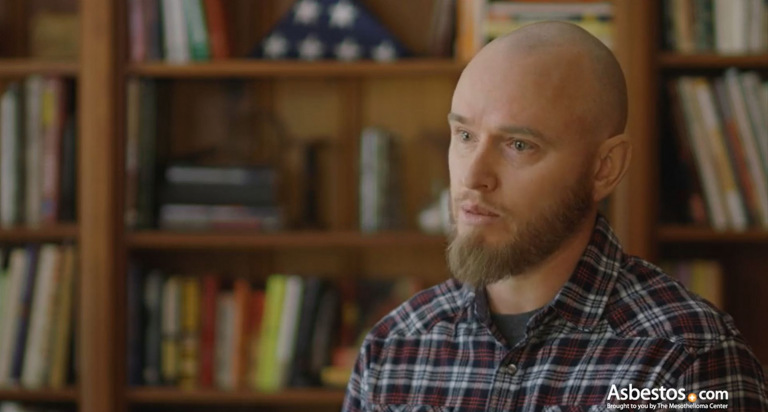Reknowned mesothelioma specialist Dr. Avi Lebenthal performed a 12-hour surgery that removed all visible sign of pleural mesothelioma. A personal call from Lebenthal convinced Odell to have surgery.
Mesothelioma & Veterans
About 30% of annual mesothelioma claims come from veterans. You might have a high risk of asbestos exposure if you served in military occupations from 1930 to 1980. Every branch of the military relied on asbestos. VA benefits are available to veterans with mesothelioma.
Why Veterans Get Mesothelioma
Veterans face a higher risk for mesothelioma due to past exposure to asbestos. From the 1930s to the 1980s, the military widely used asbestos for its heat-resistant qualities. It was found in many materials, including insulation and shipbuilding. Understanding this history can help us support our veterans better today.
Asbestos is known to be the main cause of mesothelioma. Tiny fibers can float in the air and, if inhaled, may get trapped in the body. This can lead to irritation and changes in cells that sometimes result in cancer. While the outlook for mesothelioma can be challenging, it’s important to note that early detection and new treatment options are helping more people live longer and healthier lives.
- Veterans with mesothelioma may be eligible for 100% disability compensation.
- Veterans may file VA claims for compensation and access VA health care for mesothelioma.
- Many veterans also receive compensation through legal settlements.
- A VA-accredited claims agent can help answer questions about VA disability.
Many veterans, especially those in the Navy, have faced higher rates of mesothelioma because of exposure to asbestos on ships, submarines and shipyards. It’s important to recognize that veterans from all branches of the military also face this risk.
Service members today might come across asbestos in older machines, buildings and military housing. When buildings with asbestos get damaged during combat, it can also pose a risk to soldiers. Moreover, family members of active duty service members and veterans could be exposed to asbestos if dust settles on uniforms, boots, or gear. It’s important to recognize these risks.
Types of Veterans Benefits for Mesothelioma
As a veteran facing mesothelioma, you may qualify for full disability compensation through the U.S. Department of Veterans Affairs. This support can also include health care services and monthly payments to help you during this time. It’s worth exploring these options to see how they can assist you.
As the surviving spouse of a veteran, you might be eligible for some helpful benefits. One such benefit is called dependency and indemnity compensation, or DIC. This support is available if your spouse passed away because of a service-related disability. We encourage you to explore these options and see how they can assist you during this time.
VA Health Care
To enroll in VA health care, considering your income level is helpful. You will also need to show proof of any illness linked to your service. For example, if you have mesothelioma and 50% of your asbestos exposure happened while you were on active duty, the VA will recognize that as connected to your service.

Learn how to access benefits available to veterans affected by an asbestos-related illness.
Get Help NowDisability Compensation
Disability compensation provides monthly support for veterans based on their level of disability. To file a service-connected disability claim, veterans need to demonstrate they have a VA-recognized condition related to asbestos such as mesothelioma.
The VA considers asbestos-related cancers such as mesothelioma 100% disabling. The amount of benefits may change depending on the number of dependents.
Single veterans with mesothelioma qualify for a monthly payment of $3,877. Married veterans receive a monthly amount of $4,098. These rates are based on the Veterans Compensation Benefits Rate Tables, which show different values for various situations.
“As a veteran, I understand how overwhelming the VA process can be. That’s why I walk the veterans I work with through every step, from filing claims to securing the benefits they’ve earned. They don’t have to go through it alone”
Special Monthly Compensation
Disabled veterans who need assistance from someone else can receive special monthly compensation. This support can range from $4,651 to more than $6,382 each month. This benefit is also available for the spouses and parents of veterans.
Rates for special monthly compensation depend on several factors, including the number of dependents.
Dependency and Indemnity Compensation
Dependency and indemnity compensation is a helpful monthly benefit for those who have lost a loved one who served in the military. If you are a surviving spouse of a veteran who passed away due to service-related disabilities, you may be eligible to receive up to $1,612.75. This support can provide some relief during a difficult time.
If you meet certain conditions, you might be eligible for an extra monthly payment. We encourage spouses of deceased veterans to file a claim to access this benefit.
VA Burial Benefits
The VA provides a burial allowance of $2,000 for veterans who pass away due to service-related issues. To access this benefit, you will need to demonstrate that you covered the costs of the veteran’s burial or funeral.
Additionally, it’s important to show that the veteran’s passing was due to a service-related disability, such as mesothelioma from military asbestos exposure. Understanding the requirements for filing a claim is essential.
Who Is Eligible for Veterans Benefits?
To make the most of your VA benefits, we recommend starting the claim process as soon as you receive a diagnosis. It’s important to gather your documentation about asbestos exposure and your diagnosis to help you file a VA claim.
Please keep in mind that the claim processing may take some time. If you think it might be easier, family members can also explore the option of applying for survivor benefits along with a disability claim. Take a moment to review the requirements for filing a VA claim to understand your options better.
- Discharge Status: Discharges from active military service under conditions other than dishonorable.
- Exposure Summary: Includes history of military job ratings, locations, etc.
- Medical Documentation: A doctor must provide medical records showing that asbestos exposure caused mesothelioma.
- Medical Evidence: Medical proof that active military duty led to asbestos exposure. The exposure must lead to mesothelioma or another asbestos-related disease.
Mesothelioma qualifies for the highest rate of VA compensation with a 100% disability rating for active cases and asbestos-related lung cancer because of their severity. Mesothelioma is a serious disease that demands immediate medical attention once diagnosed.
Once you’ve met the requirements, seek a VA-accredited claims agent. They can lead you through the process and ensure you receive compensation. A VA-accredited claims agent makes the process easier from start to finish.
Asbestos-Related Diseases That Qualify for VA Benefits
Exposure to asbestos can lead to various health issues. Here are some asbestos-related diseases that may qualify you for VA benefits.
- Asbestosis
- Bronchus cancer
- Gastrointestinal cancer
- Interstitial pulmonary fibrosis
- Larynx cancer
- Lung cancer
- Mesothelioma
- Pharynx cancer
- Pleural effusion
- Pleural plaques
- Urogenital cancers (except prostate)
Veterans who have mesothelioma deserve support to access the benefits available to them. We encourage you to reach out to a VA-accredited claims agent. They can guide you through the claim process and help you get the assistance you need.
“I’m an ex-Marine, and I’ve already beaten the odds,” said David Cutts, a pleural mesothelioma survivor and veteran. “I was given six months to a year to live six years ago. It’s important that people understand there is hope.”
Treatment for Veterans With Mesothelioma
The most common treatments for mesothelioma include surgery, chemotherapy and radiation therapy. The symptoms of mesothelioma may not appear for many years after your service.
If you receive a mesothelioma diagnosis, it’s really important to connect with a specialist about your history and any risk of exposure to asbestos during your time in the military. The VA can help you access some of the top mesothelioma specialists in the United States. They are ready to offer you the best treatment options available for veterans.
Veterans Choice Program allows eligible veterans to receive care outside the VA. A veteran living more than 40 miles from the nearest VA facility may be eligible. The same is true if you can’t get an appointment within 30 days. Veterans should talk to their VA doctor about their options.
“I would tell anyone diagnosed to look beyond where they normally would for treatment. There are experts out there who can treat this disease, but you have to find them,” said Odell R., Navy veteran and pleural mesothelioma survivor.

“After reading the guide, I felt more confident about what was ahead.” – Carla F., mesothelioma survivor
Get Your Free GuideWhat to Do Next
If you notice any signs or symptoms of mesothelioma or other diseases related to asbestos, it’s important to reach out for help. Taking action early gives you more treatment choices and can lead to better results. Your health matters, so please don’t hesitate to seek advice.
- Determine if you had exposure to asbestos in the military.
- If you’re experiencing symptoms, tell your doctor and find a specialist. Patient Advocates can locate one in your area.
- If mesothelioma is a possibility, get an official diagnosis.
- Find specialized treatment. The Mesothelioma Center can provide options available through the VA or non-VA options.
- If you’re a caregiver to a veteran with mesothelioma, learn more about how to support them. Caregiver resources are available.
- Explore VA benefits and legal options for you and your family. A VA-accredited claims agent can answer your questions.
- Think about starting palliative care alongside your treatment. If you have a late-stage diagnosis, consider hospice care.
The Mesothelioma Center helps veterans and their families through every step of the process. Our resources can help you navigate the complexities of diagnosis, treatment and benefits. Since 2018, our Veterans Department has helped thousands of vets and their loved ones file a VA claim.
If you are a veteran dealing with an asbestos-related illness, please remember that you are not alone. Many others have faced similar challenges without knowing about their exposure. However, there is hope! You can find resources and support to help you during this tough time. We are here to help you navigate through it.
15,245
Number of U.S. veterans The Mesothelioma Center helped since May 2017.
Commonly Asked Questions From Veterans With Mesothelioma
- Is mesothelioma a VA disability?
-
If the majority of a veteran’s lifetime exposure to asbestos occurred on active duty, the VA can approve a mesothelioma diagnosis as a service-connected disability for benefits.
Answered By: Aaron Munz, director of Veterans Department & Former U.S. Army Captain
- What is the VA Disability Rating for mesothelioma?
-
If the cancer is determined to be service-connected, the disability rating will be 100% as long as the cancer is active and for six months following the final treatment.
Answered By: Aaron Munz, director of Veterans Department & Former U.S. Army Captain
- Are there any resources specifically for veterans with mesothelioma?
-
Veterans may qualify for VA Disability Compensation and VA health care if military service caused or worsened their health conditions. Veterans’ families can stay at Fisher House homes while a veteran is in the hospital receiving medical care.
Answered By: Aaron Munz, director of Veterans Department & Former U.S. Army Captain





